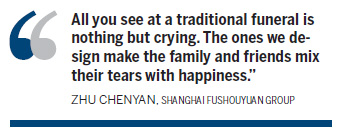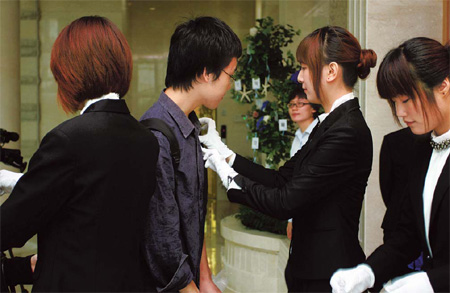Society
Planning to capture beauty of life
By Yang Yijun and Tang Zhihao (China Daily)
Updated: 2011-04-05 07:37
 |
Large Medium Small |
|
Funeral planners receive a guest at a ceremony in Fushouyuan, operator of one of the largest cemeteries in Shanghai. Provided to China Daily |

SHANGHAI - Zhu Chenyan never expected a dramatic change in her job when she was a wedding planner three years ago. Now, she plans funerals.
As one of the first group of planners for personalized funerals in the country, the 29-year-old says her shift in profession was "sheer coincidence".
"When my boss decided to develop the new funeral business in 2007, there were no such professionals. So she approached me, since she thought a planner, whether for weddings or funerals, shared certain similarities," she recalls.
In fact, traditional Chinese funerals hardly need a planner as they follow a pattern: families bid farewell and invite monks to say prayers . But Zhu says personalized funerals are for those who believe traditional ceremonies are not enough to express their love for the deceased.
"I witnessed the funeral for a child when I joined the company. It was a traditional one," Zhu says. "I had just had my own baby and I felt the ritual was not enough to express the parents' emotion. I thought I could make some changes."
Zhu works for Shanghai Fushouyuan Group, a major funeral company with investment from the private equity firm Carlyle Group. Fushouyuan launched personalized funeral services in 2008.
The personalized funeral usually contains two parts: an outdoor ceremony to bury the ashes and an indoor memorial.
"All you see at a traditional funeral is nothing but crying. The ones we design make the family and friends mix their tears with happiness, because we offer an opportunity for them to remember the person's life and think about what they can learn," she says, adding that the essence of her job is "to discover the beauty of the deceased".
One of the most memorable funerals she arranged was for a university student who chased a thief to help a passerby and was stabbed by the robber. The theme was "ocean and heaven", as the student's name was Wang Yang, which means ocean in Chinese. The hall was decorated with blue and white flowers and balloons and each guest was given a label in the shape of a water drop in blue and white. Wang's picture and quotes from his blog were displayed in the hall. But the most special part of the funeral was a puzzle made from one of his photos.
"Some of his classmates were invited on the stage to share their stories of Wang. When each of them finished, they put a piece of the puzzle in a frame. When it was complete, the puzzle made a picture of Wang," Zhu says.
In most cases, Zhu and her team has only one week to prepare a funeral. The number of members participating depends on the scale, but for each funeral they will have at least a planner, who is in charge, a master of ceremonies, a sound engineer, a scriptwriter and a florist.
The team providing the personalized funeral service was originally a department of the Fushouyuan Group, but it became a separate subsidiary this year.
"We have about 40 employees, all with an educational background above college level and most of them were born in the 1980s. Ten of them are funeral planners," says Zhu, who is deputy general manager.
New employees have to be trained for at least six months before they become a qualified funeral planner. "We only choose females because they are more sensitive and tender. Besides, we prefer good-looking young ladies, as we believe our customers will have a better impression of them," she says.
Zhu says she has changed a lot since she became a funeral planner, adding: "I find I'm more beautiful than before. I mean mentally. I'm more sensitive, yet stronger."
The peak seasons for the team are Tomb-sweeping Day every April 5 and the winter solstice, which falls on Dec 21 or 22, a day Chinese consider an auspicious time to bury ashes.
Last December, the company did more than 300 personalized funerals. At the time, staff arrived at the cemetery, which is more than 40 kilometers from downtown, at 3 am and returned home after 4:30 pm.
"People think we're rich because we're doing a job most of them are unwilling to do. However, the average income of a funeral planner is between 30,000 and 50,000 yuan ($4,500 to $7,600) a year, nothing special when compared with a college graduate."
According to Zhu, none of the team has quit so far. "I know people may have some negative views about us, as the funeral industry is considered to have unreasonably high profits, but all of us have a clear conscience, otherwise we wouldn't dare work in cemeteries when it's dark." she says.
Zhang Hongchang, secretary-general of the China Funeral Association (CFA), says the development of personalized funerals is a growing trend in China.
Rising disposable incomes and people's desire to distinguish themselves from others have triggered demand in recent years. Fushouyuan Group said it held 637 personalized funerals in 2010, up from 78 funerals in 2008. The cost ranged from 3,000 yuan to 30,000 yuan.
Funeral companies still have difficulties hiring new employees, however. "Some people lose interest in the job as soon as they see it's with a funeral company," says Zhu.
As it is considered a mysterious industry with many taboos, many still feel uncomfortable working at funeral companies, while parents will stop children from taking such jobs to avoid being discriminated against.
"Cemeteries are always described as being cold and lifeless in Chinese culture, but that's not the case," says Zhao Xiaohu, general manager of Binhaiguyuan Cemetery in Shanghai.
Although he said it is relatively easy to hire staff in Shanghai because the young people there are open-minded, he admitted things are more complex in smaller cities.
Zhao said the biggest challenge is how to better understand clients' requirements and do everything correctly. "We have only one opportunity to get things right," says Yi Hua, deputy general manager of Fushouyuan Group.
Since the funeral planning business is new in China, companies and individuals are keeping a close eye on the market. However, it is not an easy market to get into.
"The funeral industry is not completely open. Many government rules and regulations apply to this industry so it may not easy for individuals to get involved in this business," Yi adds.
| 分享按钮 |
